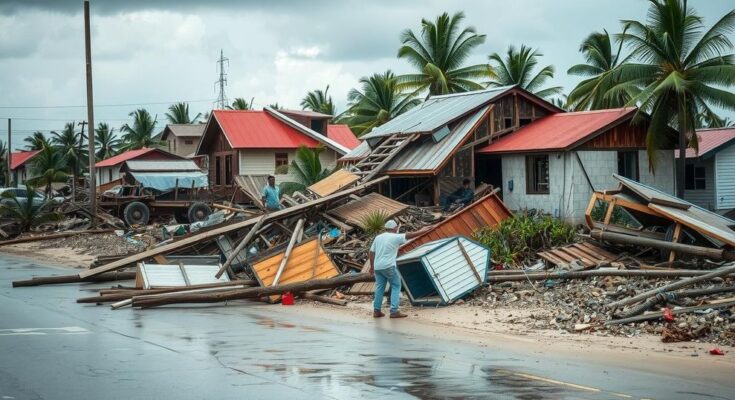Cyclone Chido resulted in catastrophic humanitarian conditions in Mayotte and Mozambique, claiming at least 120 lives in Mozambique and 35 in Mayotte. Over 380,000 individuals are affected, with urgent needs for housing, food, and psychological support. Humanitarian organizations are actively involved in assessing and addressing these needs.
The aftermath of Cyclone Chido, which struck the Indian Ocean islands and northern Mozambique from December 14 to 17, has left the regions of Mayotte and Mozambique in dire humanitarian conditions. With winds reaching 243 km/h, the cyclone uprooted communities, leading to extensive disruptions in power, water supply, and communications. A report indicates a rising death toll, with at least 120 fatalities in Mozambique and 35 in Mayotte, along with over 2,500 injuries reported.
In Mayotte, the devastation is profound, particularly in areas characterized by overcrowded and fragile housing. Affected residents, such as an eight-year-old boy named Kamar, described losing everything, highlighting urgent requirements for food, water, clothing, and electricity. The severity of the destruction in Mozambique is equally alarming, where an estimated 380,000 individuals face critical needs, including more than 90,000 children in Cabo Delgado. Reports from local authorities note that the districts of Mecúfi and Metuge have faced particularly extensive damage.
Humanity & Inclusion (HI) is actively engaged in assessing the needs of the affected populations. As elucidated by their Mozambique programme director, Pauline Jacquart, homes have been nearly annihilated in Mecúfi, leaving approximately 16,000 families homeless. The emphasis is placed not only on physical relief such as shelter and cooking utensils but also on psychological support for the many who have experienced trauma from the cyclone’s rapid destruction of their livelihoods.
As the residents attempt to rebuild, emergency workers like Claire, a nurse in Mayotte, recount the extensive devastation. “Nobody had ever seen or experienced anything like this before. Mayotte is a very green island, but here it was as if there’d been a huge fire and everything had been razed to the ground. It was as if everything had died.” Humanitarian organizations continue to work closely with local authorities and various partners to monitor and respond to this crisis as the need for aid persists amidst ongoing assessments of the areas affected.
Cyclone Chido, which impacted Mayotte and northern Mozambique from December 14 to 17, has emerged as a catastrophic event, resulting in significant infrastructure damage and loss of life. The cyclone’s powerful winds and torrential rains led to widespread destruction, activating emergency protocols for humanitarian assistance. The conditions following the cyclone necessitate urgent intervention for displaced populations, especially in vulnerable regions like Cabo Delgado in Mozambique, where children are disproportionately affected. The efforts of organizations like Humanity & Inclusion highlight the ongoing challenges faced by residents as they navigate the recovery process after this natural disaster.
In summary, Cyclone Chido has inflicted substantial humanitarian crises in Mayotte and Mozambique, with rising fatalities and countless individuals left homeless. The immediate response focuses not only on physical aid but also on mental health support for affected communities. As organizations like HI engage in necessary assessments and interventions, the call for increased assistance remains critical for the recovery of these devastated regions.
Original Source: reliefweb.int




